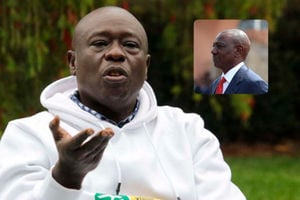
Interior Cabinet Secretary Kipchumba Murkomen when he appeared before the National Assembly Committee on Administration and Internal Security.
The State has invoked the Official Secrets Act in a bid to clamp down on the sharing of ‘classified’ information by public officials, particularly targeting former Deputy President Rigathi Gachagua and former Public Service Cabinet Secretary Justin Muturi.
The move appears aimed at silencing dissenters who have exposed alleged wrongdoing within the government.
Appearing before the National Assembly’s Administration and Internal Affairs Committee on Tuesday, Interior Cabinet Secretary Kipchumba Murkomen warned that those who divulge classified government information risk prosecution under the Official Secrets Act.
His remarks were rebuffed by Mr Muturi and lawyers David Ochami and Anthony Musau, who said that such an approach violates the Constitution. Nevertheless, CS Murkomen maintained that the oath of secrecy taken by public officers prohibits them from disclosing classified information.
“There are those who are older but do not abide by the Act,” said CS Murkomen, adding, “There are attendant consequences to this.” According to the CS, disclosing classified information to the public “says something about the person you have entrusted with a public office.”
Section 3 of the Official Secrets Act, read together with Section 20, provides that the unauthorised disclosure of government information can attract a prison term of up to 14 years without the option of a fine.
The Act states that any person who possesses or controls any plan, article, document, or information entrusted in confidence to them by a government official, and subsequently discloses it, is guilty of an offence.
CS Murkomen’s remarks followed a question from Saku MP Dida Rasso.
“I understand that anyone working in, or having worked in, government is bound by the Official Secrets Act not to divulge government information unnecessarily,” said Mr Rasso, in apparent reference to Mr Muturi and Mr Gachagua.
He added, “If we do not abide by the law, we run the risk of losing the country.”
Mr Muturi and Mr Gachagua have recently been vocal about alleged corruption and the abuse of human rights under the Kenya Kwanza administration, including reports of politically motivated arrests and enforced disappearances.
Mr Muturi previously claimed that the National Intelligence Service (NIS) abducted his son and held him incommunicado, prompting him to seek President William Ruto’s intervention.
He also alleged that he was coerced by President Ruto into signing a multi-billion shilling tree-planting deal with the Russian government at a foreign airport.
“All I did was respond to President Ruto, who was my coalition partner within the Kenya Kwanza alliance, because he had exposed me to the public. In any case, I cannot respond to Murkomen because he is not at my level,” said Mr Muturi.
The Official Secrets Act was initially intended to protect the State and its citizens from imminent or foreseeable threats—not to curtail free speech or restrict democratic freedoms. Freedom of expression is enshrined in the Bill of Rights, and Article 24 of the Constitution outlines the conditions under which such rights may be limited.
Mr Ochami says any limitations must be “reasonable and justifiable in a democratic society,” adding that Article 33 only allows for curbs on free expression in cases involving incitement to violence, hate speech, or propaganda for war.
Mr Muturi also claimed that President Ruto was using Indian conglomerate Adani to capture the operations of Jomo Kenyatta International Airport (JKIA).
Mr Gachagua has also publicly accused President Ruto of engaging in questionable business dealings with leaders of Sudan’s Rapid Support Forces (RSF), a militia group blamed for fuelling instability in that country.

Former Deputy President Rigathi Gachagua.
Mr Ochami notes that contrary to popular belief, the Official Secrets Act does not offer blanket protection to all classified information.
“Despite the Act, past and present officials cannot be penalised for disclosures made in the public interest, especially if the information prevents crimes or wrongdoing by the State.”
Mr Musau says that the current application of the Official Secrets Act is at odds with the spirit of a democratic society.
“The necessary safeguards to prevent abuse by an overzealous regime are lacking. More concerning than the law itself is the failure of public officials - and Kenyans generally - to uphold the values enshrined in our Constitution.”
He adds that regardless of the law, Kenyans should not be discussing measures that suppress free speech.
“The Constitution is the supreme law and binds all persons, including Mr Murkomen, as well as all State organs at both levels of government,” said Mr Musau.
dmwere@ke.nationmedia.com








